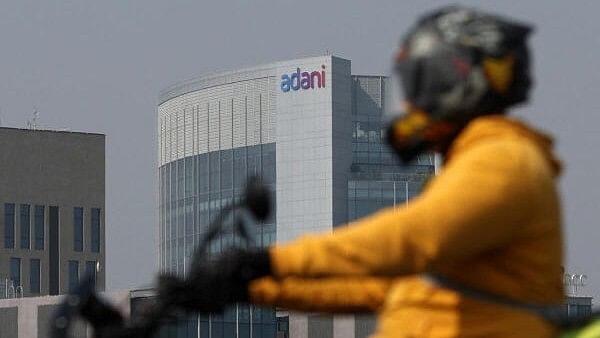
A man rides his motorbike past the Corporate House of Adani Group on the outskirts of Ahmedabad, India, November 21, 2024.
Reuters
Following the early 2024 Hindenburg shock report and the 'conflict of interest' murkiness that continues to cloud dealings between SEBI chief Madhabi Buch and the Adani Group, November 21 dawned with further bad tidings for the Group.
Billionaire-businessman Gautam Adani was charged by United States prosecutors over his role in an alleged years-long scheme to pay $250 million (about Rs 2,100 crore) bribe to Indian officials in exchange for favourable terms for solar power contracts.
The Adani Group was quick to respond with a denial. "The allegations made by the US Department of Justice and the US Securities and Exchange Commission against directors of Adani Green are baseless and denied," the group spokesperson said in a statement.
But despite the denial, it seems that the solar energy contract bribery case could be how this group's house of cards goes down. The indictment is the latest in a series of setbacks, internationally, which the group has faced.
The first sign of trouble loomed a few years ago in Australia — about the environmental clearances for the Adani coal mine in the country's Queensland state with an Indigenous group demanding the government investigate the alleged breaches of the conditions that protected the site.
The mine had commenced operations in 2021 despite widespread opposition across Australia and the world. Subsequently, scientists have noted drops in water levels in bores around the Doongmabulla Springs 'hundreds of times', as per one Guardian report. Hydrocarbons associated with coal have also been found in bores and the springs themselves.
Adani rejected the claims, saying the springs had not been damaged by the Carmichael coalmine, operated by Bravus – a subsidiary of the Indian-owned Adani Group – and the company was fully compliant with environmental conditions.
A similar pattern of allegations and denials have followed since. Most recently, two stick out in memory.
Around a month back, on October 14, Sri Lanka's new government, led by Anura Kumara Dissanayake, told the Supreme Court that it would reconsider the approval granted by the previous government to the Adani Group for a wind power project.
It was one of the poll promises Dissanayake made in the run-up to Sri Lanka's September 21 presidential election, pledging that his National People’s Power (NPP) alliance would annul the project. The NPP had claimed that the project posed a threat to Sri Lanka’s energy sector sector sovereignty.
The logo of the Adani Group is seen on the facade of its Corporate House on the outskirts of Ahmedabad.
Credit: Reuters Photo
The Adani Group had been set to invest over $440 million in the 20-year agreement for the development of 484 megawatts of wind power in the northeastern regions of Mannar and Pooneryn before the project faced fundamental rights litigation in Sri Lankan Supreme Court.
Discontent over Adani's power supply deal also reared its head in neighbouring Bangladesh after Adani Power Jharkhand Limited (APJL), a wholly-owned subsidiary of Adani Power, stopped supplying half of the stipulated power supply to Bangladesh because of outstanding bills of $846 million. Bangladesh is still facing a continuing shortage of electricity, increasing the risk of blackouts, even after the government made a partial payment to the power plant in India.
Bangladesh's High Court, consequently, ordered the formation of a high-level enquiry committee, comprising international energy and law experts to reevaluate all electricity-related agreements with the Adani group, first reported by Business Standard, on Tuesday, November 19.
The order directs the cabinet secretary to form the committee within a month and submit the report to the court in the next two months. Additionally, the bench of Justice Farah Mahbub and Justice Debasish Roy Chowdhury issued a rule, asking the authorities to explain why instructions should not be given to cancel the 'lopsided agreements' with Adani.
The electricity supplied by Adani costs Bangladesh about Tk12 (Rs 8.48) per unit, as per the latest audit report for the fiscal 2023-2024. The cost is 27% higher than the rate charged by other private producers in India and up to 63% more than that of Indian state-owned plants.
The US prosecutors' allegations come in the backdrop of such added scrutiny around the Adani Group of companies' projects outside India. As the pressure continues to build internationally, it has given political heft, domestically, to the narrative that the Narendra Modi government is 'shielding' the billionaire.
The Opposition has lost no time asking for a comprehensive probe into the allegations even as the rot has become apparent in the 'Watchmen' executive institutions of India, like the regulatory authorities and the bureaucracy — a Catch 22 situation.
Furthermore, the new allegations of Indian government officials being bribed for solar energy contracts come at a particularly delicate time — poised midway between vote casting and counting in Maharashtra and Jharkhand. In the months ahead, if these allegations were to stick on, the Opposition could use it against the Bharatiya Janata Party (BJP) in the campaign for the Delhi Assembly polls.
While the Modi-led government has released no statements, battle plans are being crafted with ahead of a contentious winter session of Parliament, where the ruling party is set to face the Opposition on a host of 'problems' from the Manipur crisis, the Delhi air pollution issue, the Waqf (Amendment) Bill and now, adding to the list, the Adani bribery case bombshell.